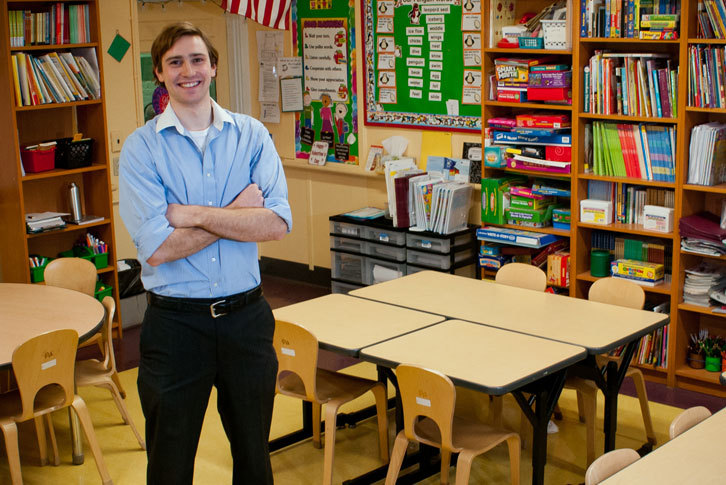Teddy Beaufaÿs, a child development major, teaches English, art and history at the German International School of Boston. He is passionate about teaching these subjects and about integrating technology into the curriculum, and he is dedicated to practicing the philosophy of whole-child education he learned at Colby-Sawyer.
Why did you choose to be a Child Development major?
I grew up in Bedford, N.Y., and started college in California, where I was a film major. When my family bought a bed and breakfast in Andover, N.H, I helped them get it going. I stopped by Colby-Sawyer to try to meet some people my age in the area and ended up talking to an admissions counselor. One thing led to another, and I enrolled as a communication studies major. I tried to keep my focus on film, but it wasn’t the same, and I nearly went back to film school. I was working at The Windy Hill School, though, and one professor had a huge impact on me and encouraged me to consider education as a career and I finally decided, yes, I’d like to be a teacher.
I earned a certificate to teach in New Hampshire but found a job three weeks after graduation teaching at the German International School of Boston, a private Massachusetts school. I’m glad I found Colby-Sawyer; it was a great experience. I keep in touch with my professors and have come back to campus to be on alumni panels because I want to give back to the child development program. Everyone who goes through it has such a great opportunity.

What is the most important thing you learned at Colby-Sawyer?
The biggest thing I learned at Colby-Sawyer is the idea that you’re teaching the whole child. A kid is not just your student in English class. He’s also part of a family; he’s a big or little brother, or someone whose parents aren’t together anymore. There’s a whole life behind that student in your classroom. We need to understand who the kids are, what they need, what engages them in class, and especially what excites them to learn. When you study child development and education, what you’re really studying is developmental psychology.
Colby-Sawyer’s child development program teaches the constructionist approach, in which students construct their own education. I use that approach as much as possible now by having my students work independently and with others, aside from teachers. That’s putting the trust in the student.
What kind of professional preparation did you receive at Colby-Sawyer?
Many child development classes at Colby-Sawyer come with a practicum, just like a science class has a lab. The college is unusual because it has its own early childhood laboratory school right on campus. Windy Hill offers the opportunity to do real, practical work with toddlers and kindergartners instead of just learning about what a classroom would be like. By the time I graduated, I’d completed three practicums and been in two public elementary schools.
My student teaching experience was significant in helping me understand how to be a teacher. I don’t think I would have been able to find a full-time job right out of school without it. That wouldn’t have made sense, actually. I student-taught in a second-grade classroom right in New London for half my senior year. It’s an awesome public school, and I was in the classroom working with the kids every day. I got to know them and give lessons and learn about classroom management as well as teaching. Now I have student teachers in my classroom!
What makes a good teacher?
I think most of it’s in your personality. You have to be a people person. A lot of people go into teaching thinking they won’t be dealing with people, and they’re completely wrong because kids are little people. You have to be outgoing, be able to talk, be able to punt if things don’t work. We have to be flexible. We need teachers who are motivated to learn and grow and participate in their own education so that they can pass that enthusiasm on to their own students.